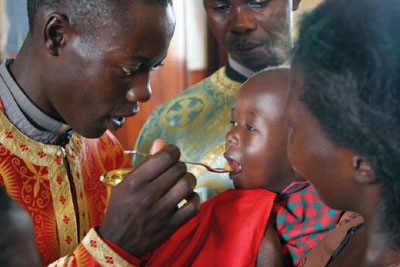Photo from here (Zambia)
Every now and then, I am blessed with an opportunity to assist my priest and ordained chanter with the Eucharist. To critics of traditional forms of Christianity, especially those who decry against ritualism, I would only wish you could be in my shoes and experienced it for yourself. Words can do no real justice to this the most important sacrament of Orthodox worship.
In the chalice was the bread, the body of Christ, floating in the wine, His blood. A member of our congregation took the time to bake the loaf. Before Matins (aka Orthros, the Morning Prayers), Fr. James carefully offered the chants and prayers that were handed down through the church for nearly 2,000 years as he cut and broke pieces of the loaf. After adding the bread to the cup of wine, the Eucharist was blessed with the aroma and smoke of incense symbolizing the presence of the Holy Spirit.
Preparing the Holy Gifts
At the high point of the Divine Liturgy, Fr. James comes though the royal doors with the chalice. One of the sub-deacons and I hold the cloth under it as one by one, the saints come forward to partake of the body and blood of our Lord. “Thy servant (thy hand maiden) comes to recieve thy precious body and blood” Fr. repeats for each member as we hold the cloth under their chins. Some are elderly, others mere babes who had just been baptized. All of us who are able had fasted through the morning that this meal was the first thing we tasted all day. We all taste from the same cup knowing that we were one with our Lord and each other. One by one, we all come to partake.
There are some things that one cannot get from the modern manifestation of a pre-packaged communion. “Ain’t you afraid of getting someone else’s germs?”.
I am more fearful of not taking in the life giving flesh and blood that Jesus offers to us. Without it, we have no life. Indeed, if we do believe this to be His body and blood, why should we fear “catching something” from someone else? The same cup brings people together with one another and with the continued history of the church. Germs and viruses only separate. Members who know they are sick are wise enough not to partake. Besides, the wine has alcohol in it, alcohol kills germs.
There is no resurrection in a piece of unleavened bread. Jesus and the disciples celebrated the Passover on the day before the great Jewish feast. Thus, they would have used leavened bread as the unleavened variety would not have been available. Leavened bread has risen as Christ Himself would and did rise from the grave. There is no need to eat the lifeless leaven of the Pharisees and Herod. Our Lord has conquered death by his death.
Nor is their any life in sealed grape juice. Our Lord’s first miracle recorded by John was changing water into wine. Does the use of the non-alcoholic make one better than those who use the substance recorded in the scriptures? If so, are we better than the best winemaker recorded in the Gospels? Is the minuscule amount of wine turn a person into a substance abuser? The amount of the Eucharist given to a toddler is no more, and probably less, dangerous than the medications prescribed by physicians.

A baptized infant receiving the precious body and blood of our Lord
When done in sincerity, any form of Communion, Eucharist, of the Lord’s Supper, can be a truly reverent experience. But there are things that cannot be contained in aluminium foil and cellophane. Resurrection, life and unity with one another are what we offer from the sacred cup in an Orthodox Eucharist. When taken in a sincere and repentant manner, we conclude worship with the fullness of the Holy Spirit. Although only the Orthodox may partake of the body and blood, we do share the remaining holy bread after the service. Come and see for yourself.
See also
"THE WAY" - An Introduction to the Orthodox Faith
Theosis (deification): The True Purpose of Human Life
How “White” is the Orthodox Church?Theosis (deification): The True Purpose of Human Life
How Our Orthodox Brethren In Zambia Commune
Sakramenti za Kanisa la Orthodox : Ubatizo, Kipaimara, Ekaristi, Kitubio au Upatanisho

Δεν υπάρχουν σχόλια:
Δημοσίευση σχολίου